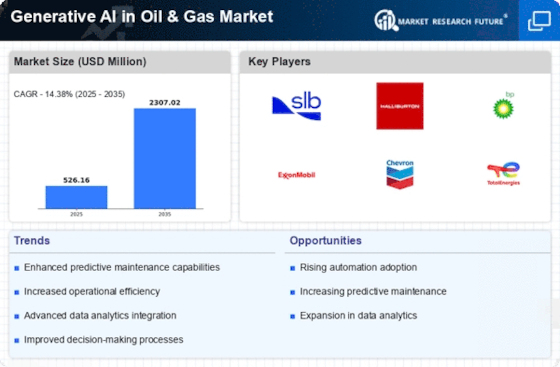Market Analysis
In-depth Analysis of Generative AI in Oil & Gas Market Industry Landscape
In the realm of the oil and gas industry, the integration of generative artificial intelligence (AI) brings forth a myriad of market factors that shape its adoption and impact. Firstly, cost efficiency emerges as a paramount consideration. Generative AI has the potential to streamline operations, optimize processes, and enhance decision-making, thereby reducing operational costs significantly. This cost-effectiveness is particularly appealing in an industry known for its high capital investments and tight profit margins.
Moreover, the demand for enhanced productivity and efficiency serves as another crucial market factor. Generative AI technologies can analyze vast amounts of data to identify patterns, predict equipment failures, and optimize production schedules. By automating repetitive tasks and offering insights into complex systems, these AI solutions empower oil and gas companies to achieve higher levels of productivity and operational efficiency.
Furthermore, the increasing emphasis on safety and risk management drives the adoption of generative AI in the oil and gas market. The ability of AI systems to monitor equipment health in real-time, detect anomalies, and predict potential hazards contributes significantly to maintaining a safe working environment. By mitigating risks and preventing accidents, these technologies help companies comply with stringent safety regulations and safeguard both personnel and assets.
Additionally, the growing focus on sustainability and environmental responsibility plays a significant role in shaping the market dynamics of generative AI in the oil and gas sector. These technologies enable companies to optimize resource utilization, minimize waste, and reduce environmental impact. By optimizing processes and reducing emissions, generative AI contributes to the industry's efforts towards sustainable development and mitigating the environmental footprint of oil and gas operations.
Moreover, the competitive landscape and market dynamics also influence the adoption of generative AI in the oil and gas sector. As companies seek to gain a competitive edge and differentiate themselves in the market, investing in advanced technologies such as generative AI becomes imperative. Early adopters of these technologies can capitalize on their benefits to improve operational efficiency, increase production, and enhance their market position.
Furthermore, regulatory compliance serves as a significant market factor driving the adoption of generative AI in the oil and gas industry. With ever-evolving regulations governing safety, environmental protection, and data security, companies need robust solutions to ensure compliance. Generative AI systems offer advanced analytics capabilities that enable companies to monitor and report on various regulatory requirements effectively.
Additionally, the global economic landscape and market trends influence the adoption of generative AI in the oil and gas sector. Economic fluctuations, supply-demand dynamics, and geopolitical factors all impact investment decisions and resource allocations within the industry. As companies navigate through market uncertainties, they seek innovative solutions such as generative AI to optimize operations, mitigate risks, and maintain profitability.


















Leave a Comment